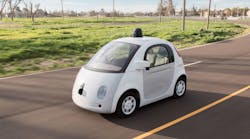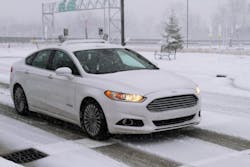Reaction mixed to Obama policy on driverless vehicles
The rollout of a new federal policy initiative by the Obama administration to further foster the deployment of autonomous vehicles (AVs) is getting mixed reaction to a degree from a variety of groups.
The National Safety Council (NSC) is whole-heartedly supporting this new policy directive, which is being spearheaded by the National Highway Traffic Safety Administration (NHTSA), as it believes wide use of AVs will reduce highway fatalities – which are experiencing a significant uptick this year.
“With an estimated 19,000 fatalities in the first six months of this year, more must be done,” noted Deborah Hersman, NSC’s president and CEO, in a statement. “This policy gives carmakers and states the green light to innovate while keeping safety at the forefront. We hope innovative manufacturers will embrace the administration’s guidelines as a blueprint for saving lives and preventing injuries.”
Ian Adams, a senior fellow with the R Street Institute, noted while the new policy’s “guidelines” are imperfect, they should be “commended” for their openness to regulatory flexibility, including exemptions from outdated regulatory standards and fast-tracked letters of legal interpretation.
“Those will both prove invaluable tools as the creators of autonomous technologies seek to conform to a body of law drafted and adopted without self-driving vehicles in mind,” he said.
Adams added that the guidelines also clearly “demarcate” areas of responsibility best left to the federal government and those best left to the states – notably recommending that the current state-based system of insurance regulation remain untouched.
“As a result, states that embrace a market-oriented approach to ratemaking and product development will be particularly well-positioned to capitalize on new technologies,” he explained.
Still, Adams noted “some areas” of concern, particularly the recommendation that NHTSA be granted authority to conduct pre-market approval of new technologies.
“Not only would that depart from existing practice that has served consumers admirably, but it also effectively would grant the federal government a veto over new technology,” he stressed.
Marc Scribner with the Competitive Enterprise Institute (CEI) also noted several flaws within this new driverless vehicle policy directive, stressing that “Congress and NHTSA” both must recognize that any unnecessary delays or additional costs to bringing AV technology to market will mean “additional traffic injuries and fatalities.”
Yet there are also widespread indications consumers remain wary of driverless cars; one reason why there may been growing pushback against this technology, to a degree.
In one survey, compiled by Altman Vilandrie & Co., found that 64% of consumers say they would not buy an AV because they believe them to be dangerous.
The firm’s also found that 57% of the consumers it polled are unlikely to buy or ride in an AV, while an additional 18% would ride in but not buy a self-driving car. Still, 25% of consumers say they would purchase an AV, despite some of them harboring safety concerns.
“There is clear evidence that a quarter of American consumers who’d prefer redirecting time spent driving towards leisure or work are very optimistic about purchasing and adopting AVs,” said Soumen Ganguly, a who co-directed Altman’s survey.
“However, despite evidence that AVs will likely reduce road fatalities, many drivers are wary of giving up control of the wheel to a software program,” he stressed. “It’s clear that to achieve broad market share the AV industry must bring the early adopters on board while also making the general driving public much more comfortable with the concept of self-driving cars.”
NSC’s Hersman agreed. “Until cars are truly autonomous with 100% reliability, we [human drivers] are still our cars’ best safety feature,” she said in her prepared statement.
Others, however, think this new policy directive opens the door more fully to autonomous commercial vehicles, particularly for highway operations.
Richard Metzler, for one – the chief marketing officer for uShip, whose freight career includes stints with FedEx, APL Logistics, and DHL Express – believes that by 2026, driverless truck technology will evolve into a core complement, not a full replacement, of what we know in trucking today.
“It’s now just a matter of when, and no longer a question of if it’s going to happen,” he said in a statement. “In 10 years, you’ll see driverless trucks used primarily for long-haul freight, out in the open spaces of [the] west where you’ve big square states, and likely less so in tighter urban areas.”
Metzler believes “single pilot drivers” will soon lead platoons of two to three separate trucks, caravan style, so more freight can be moved longer distances. That freight when then be taken the “final mile” by manned trucks, or even Uber-like managed truck drivers.
“At least in my lifetime, there will always be some human element needed at pickup and delivery due to the variances and judgment required when dealing with delays, waiting, scheduled deliveries, breakdowns, docks, lift gates and more,” he added. “Eventually, I suppose that could give way to automated warehouse technology similar to what Amazon uses today.”

